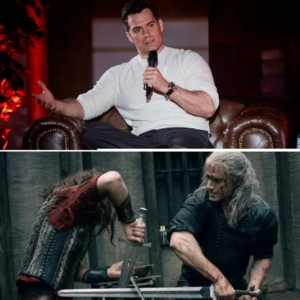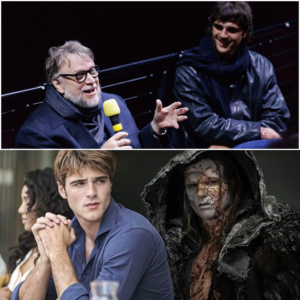The neon glow of Broadway’s marquees flickered like distant stars against the velvet September sky, but on Sunday night, September 28, 2025, all eyes were fixed on one man: Keanu Reeves. At 61, the eternal everyman of Hollywood—whose brooding intensity has powered blockbusters from The Matrix to John Wick—stepped into the unforgiving spotlight of the Great White Way for his Broadway debut. And he didn’t arrive alone. Hand in hand with his girlfriend of seven years, the luminous artist Alexandra Grant, Reeves turned the red carpet outside the historic Hudson Theatre into a scene straight out of a romantic indie film. Their tender, unhurried stroll down the crimson path, punctuated by stolen glances and soft laughter, offered a rare glimpse into the quiet devotion that has defined their low-key romance amid the chaos of fame. As paparazzi flashes erupted like fireworks and fans chanted “Keanu! Keanu!” from behind velvet ropes, the couple paused for a portrait that spoke volumes: Reeves in a tailored black blazer over a crisp white shirt, silver tie glinting like a secret promise, paired with his signature unpretentious dirty brown hiking boots; Grant, elegant in a flowing emerald gown that echoed her vibrant abstract paintings, her silver-streaked hair cascading freely. It was a date night for the ages, celebrating not just a theatrical milestone, but the profound partnership that has sustained Reeves through life’s tempests.
Inside the 1,200-seat Hudson Theatre—revitalized in 2017 after decades as a film house—the air hummed with anticipation. This was no ordinary opening night. Samuel Beckett’s Waiting for Godot, the existential tragicomedy that premiered in 1953 and has since become a cornerstone of 20th-century theater, was reborn under the visionary direction of Olivier Award-winner Jamie Lloyd. Known for his stark, immersive revivals like the Tony-winning Sunset Boulevard and Jessica Chastain’s A Doll’s House, Lloyd stripped the play to its raw essence: two bowler-hatted tramps, Vladimir and Estragon, bickering and bantering on a barren stage as they await a mysterious savior who never arrives. In a stroke of casting genius, Reeves embodies the hapless, memory-lapsed Estragon (or “Gogo”), while his real-life best friend Alex Winter—famous as Bill S. Preston, Esq., in the Bill & Ted trilogy—takes on the more philosophical Vladimir (“Didi”). Their onstage chemistry, forged in the fires of 1980s teen comedy, crackles with vaudeville flair, turning Beckett’s abyss of absurdity into a darkly hilarious mirror for our fractured times.
As the curtain rose—or rather, as the lights dimmed on a minimalist set of cracked concrete and flickering shadows—the audience leaned forward, breathless. Previews had begun on September 13, building a feverish buzz with sold-out houses and whispers of “brilliant” from early tastemakers. But opening night was electric. Brandon J. Dirden, the Tony-nominated powerhouse from Jitney, commands the stage as the tyrannical Pozzo, his booming baritone laced with menace and pathos. Opposite him, Michael Patrick Thornton—whose cerebral palsy infuses his portrayal of the enslaved Lucky with unflinching authenticity—delivers a monologue that halts hearts: a torrent of pseudo-intellectual gibberish that erupts like a philosophical volcano, leaving patrons stunned into silence. Young Zaynn Arora and Eric Williams alternate as the ethereal Boy, messengers of the absent Godot, their innocence a poignant counterpoint to the adults’ despair. Understudies Jesse Aaronson and Franklin Bongjio stand ready, ensuring the limited run through January 4, 2026, remains seamless.
Backstage, before the show, the energy was a whirlwind of nerves and nostalgia. Reeves, ever the gentleman philosopher, had spent the afternoon in quiet ritual: a motorcycle ride through Central Park to clear his mind, followed by a light vegan lunch with Grant at a tucked-away SoHo café. “Theater is vulnerable in a way film isn’t,” Reeves confided to Playbill in a pre-opening interview, his voice a soft rumble honed by decades of action-hero grit. “You’re there, eight times a week, no takes, no edits. Just you and the void.” Grant, 52, nodded beside him, her hand resting lightly on his knee—a gesture both protective and proud. The couple, who first collaborated artistically in 2011 on Reeves’ book Ode to Happiness, have long blurred the lines between lovers and creators. Her text-based installations and paintings often explore themes of silence and waiting, mirroring Beckett’s obsessions. “Keanu’s Estragon is a man adrift in his own skin,” she said, her eyes sparkling. “It’s brave, raw—everything he is.”
Their red carpet arrival at 7:15 p.m. was the stuff of tabloid dreams. Emerging from a sleek black SUV, Reeves extended his hand to Grant with the chivalry of a bygone era, helping her navigate the throng of photographers. “Over here, Keanu! Alexandra, this way!” shouted the calls, but the pair moved at their own pace, pausing to wave at fans clutching John Wick posters and Bill & Ted memorabilia. One admirer, a 25-year-old theater student from Brooklyn, thrust forward a program: “Your John Wick saved my sanity during lockdown—now Godot will save my soul!” Reeves knelt to sign it, his smile genuine, before rising to plant a discreet kiss on Grant’s temple. In an age of performative celebrity, their affection felt refreshingly real—no Instagram filters, no scripted soundbites. Just two souls, intertwined.
The rumors that had swirled earlier in the month—whispers of a secret wedding fueled by Grant’s cryptic Instagram post on Reeves’ September 2 birthday, featuring a heart-shaped cake captioned “I am so grateful for your love and partnership”—added a layer of intrigue. Paparazzi had swarmed their Los Angeles home, speculating over matching rings and hushed conversations. But Reeves’ publicist quashed it swiftly on September 22: “It is not true. They are not married.” Yet, as they ascended the Hudson’s grand staircase, arm in arm, the speculation only amplified their allure. Grant, born in 1973 in Fairborn, Ohio, but raised in Mexico City and Los Angeles, has carved a niche as a conceptual artist whose work grapples with language’s failures—echoing Godot‘s futile dialogues. Her 2011 collaboration with Reeves birthed X Artists’ Books, a press that has published intimate volumes like Ladders (2016), where Reeves’ handwritten South American travels intertwine with her illuminated texts. “Alex sees the poetry in my chaos,” Reeves once told The New Yorker. “She’s my anchor in the storm.”
Their relationship, public since their red carpet debut at the 2019 LACMA Art + Film Gala, has weathered scrutiny with quiet grace. After Reeves’ heart-wrenching losses—the stillborn daughter with ex-girlfriend Jennifer Syme in 1999, Syme’s tragic death in a 2001 car crash, and his sister’s leukemia battle—Grant emerged as a steady light. No lavish proposals or viral engagements; just shared hikes in the Hollywood Hills, gallery openings in Echo Park, and motorcycle jaunts where Grant clings to Reeves’ leather-clad back, wind whipping through her hair. “We’re partners in the truest sense,” Grant shared in a 2023 Vogue profile. “Art, life, love—it’s all waiting, isn’t it? For the next stroke, the next scene.” Fans, dubbing them #KeanuAndAlex, devour these glimpses, flooding social media with fan art of the duo as Beckett’s tramps, bowler hats askew.
As the house lights dimmed at 8 p.m., the couple settled into prime orchestra seats, courtesy of producer Scott Rudin. The production’s design is a masterclass in minimalism: Soutra Gilmour’s set—a desolate expanse of rubble under Ben Stones’ projections of swirling voids—evokes a post-apocalyptic limbo. Lighting designer Neil Austin bathes the stage in harsh fluorescents that flicker like dying stars, while George Dennis’ soundscape pulses with distant echoes, amplifying the play’s rhythmic banter. Lloyd’s direction, true to his signature style, forgoes props for physicality: Reeves and Winter circle each other like caged animals, their bodies contorting in Butoh-inspired agony, sweat-slicked shirts clinging in the humid air.
The first act unfolds with hypnotic precision. “Nothing to be done,” intones Winter’s Vladimir, his voice a weary baritone laced with wry humor, as he plucks at his bowler hat. Reeves’ Estragon, boots caked in imaginary mud, retorts with petulant fire: “I’m going.” “We can’t.” “Why not?” “We’re waiting for Godot.” The exchange, Beckett’s eternal loop, lands like a gut punch, eliciting gasps and uneasy chuckles. Their friendship shines through—Winter’s Didi, ever the optimist, hoists Reeves’ Gogo like a ragdoll during a vaudeville tumble; Reeves, in turn, mirrors Winter’s existential rants with deadpan exasperation. Critics in previews raved: The New York Times called it “a revelation—Reeves’ physical comedy rivals his Matrix wire-fu, while Winter’s intellect pierces the soul.” Variety dubbed the duo “dystopian Laurel and Hardy,” praising Dirden’s Pozzo as a “roaring tyrant whose whip cracks like thunder.”
Intermission buzzed with fervor. In the lobby, champagne flutes clinked as A-listers mingled: Matt Damon, whispering congrats to Reeves; Winona Ryder, reminiscing about Bram Stoker’s Dracula with Winter; even Jamie Lee Curtis, who hugged Grant fiercely, gushing over her latest exhibit at the Hammer Museum. “This is Keanu’s night,” Curtis told People, “but Alexandra’s the quiet force behind it. Their love? It’s the real plot twist.” Outside, scalpers hawked $500 tickets, while fans queued for the 10:30 p.m. after-party at The Ned NoMad, a speakeasy-chic hotspot where the cast would unwind.
The second act ratchets the despair. Pozzo, blinded in a Beckettian twist, crawls onstage, Dirden’s transformation from bluster to brokenness wrenching tears. Lucky’s “Think!” speech, delivered by Thornton in a frenzy of spasms and syllables, clocks in at seven breathless minutes—a tour de force that earned a mid-speech ovation. As the tramps contemplate hanging from a barren tree, Reeves’ Gogo whispers, “Let’s go,” only for Winter’s Didi to reply, “We can’t. We’re waiting for Godot.” The lights fade on their bowed heads, the silence deafening. Thunderous applause erupted for five minutes straight, with standing ovations rippling from the mezzanine. Reeves and Winter, drenched and beaming, took 14 curtain calls, pulling Lloyd center for bows. Grant, tears streaking her cheeks, blew a kiss from her seat, her applause the loudest.
Post-show, the after-party transformed The Ned into a velvet-draped salon. Crystal chandeliers cast golden halos over passed trays of truffle arancini and elderflower cocktails. Reeves, jacket slung over his shoulder, held court in a corner booth, Grant at his side, her head on his shoulder. “Broadway’s a beast,” he admitted to a cluster of admirers, including The Hollywood Reporter‘s critic who called the revival “a mixed bag of bleak brilliance.” “But with Alex here, and Alex [Winter] onstage—it’s family.” Winter, nursing a whiskey sour, chimed in: “Keanu and I prepped like mad—clowning classes, Beckett marathons in his library. We even debated pronouncing ‘Godot’ for hours. GOD-oh, settled.” Their laughter echoed, a balm against the play’s chill.
Grant, meanwhile, bonded with Lloyd over shared artistic obsessions. “Jamie’s vision—it’s like my installations,” she said, sketching invisible lines in the air. “Waiting as creation, absence as presence.” The director, fresh from Sunset Boulevard‘s triumph, beamed: “Keanu and Alex are alchemists. They turn nothing into everything.” As midnight struck, the couple slipped out a side door, hand in hand, dodging the lingering press. “Home?” Reeves murmured. Grant nodded, her smile radiant. In a city that never sleeps, they vanished into the night—a private encore to a public triumph.
Waiting for Godot‘s prescience feels eerily timely. In an era of endless scrolling and deferred dreams—pandemics, politics, personal voids—Beckett’s tramps resonate as everymen in existential exile. Reeves, who lost his sister to leukemia in 2001 and has channeled grief into philanthropy via his private cancer research foundation, brings lived authenticity to Gogo’s amnesia. “The play’s about holding on when nothing comes,” he told The Guardian during rehearsals. “I’ve waited—a lot.” Winter, 60, echoes this: His journey from child actor in The King and I to documentarian (Downloaded, on Napster) mirrors Didi’s dogged hope.
The production’s box office shattered records: Previews grossed $1.2 million in two weeks, with single tickets topping $300 and premiums at $500. Telecharge crashed twice from demand, and international fans— from Tokyo to Toronto—snap up flights. “It’s not just Keanu,” notes producer Sonia Friedman. “It’s the reunion, the relevance. Godot’s our mirror now.”
For Reeves and Grant, this Broadway foray marks a pinnacle in their intertwined lives. Their Los Angeles nest— a modernist haven filled with Grant’s glowing canvases and Reeves’ motorcycle collection—has been a creative cocoon. Recent projects include Grant’s solo show at Gagosian, exploring “erotic silence,” and Reeves’ BRZRKR comics, a blood-soaked allegory of immortality’s curse. Yet, amid Hollywood’s frenzy, Broadway beckons as a return to roots: Reeves’ early theater days in Toronto’s High School of the Arts, Grant’s MFA from California College of the Arts.
As the run stretches into winter, expect sold-out houses and Tony buzz. Early whispers peg Reeves for a nomination—his first in drama—while Lloyd eyes another Olivier import. But beyond awards, this is Reeves’ reclamation: From action icon to introspective artist, arm-in-arm with the woman who sees his depths.
In the afterglow of opening night, as confetti rained on Times Square and cabs honked their approval, one thing lingers: Reeves and Grant, defying the wait. Godot may never come, but love, it seems, arrives right on cue. Tickets are vanishing fast—don’t wait.





